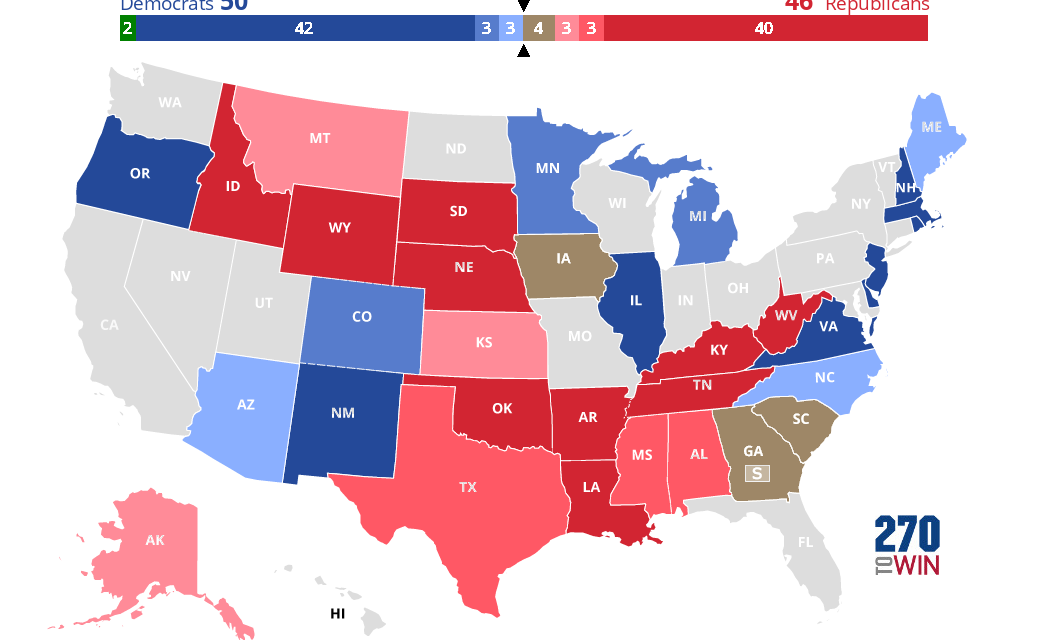Map: 270ToWin
Jump to Original Entry
UPDATE, NOV. 3
Final estimate — Democratic chance of majority (51-49) is 75%.
Final State Estimates
- Minnesota: Lewis (D) 95% chance of victory, up from 94%
- Colorado: Hickenlooper (D) 84%, down from 85%
- Michigan: Peters (D) 83%, up from 82%
- Arizona: Kelly (D) 78%, down from 79%
- North Carolina: Cunningham (D) 68%, up from 64%
- *Georgia Special: Warnock (D) 63%
- Maine: Gideon (D) 59%, up from 57%
- Georgia: Perdue (R) 57%, down from 58%
- Iowa: Ernst (R) 58%, up from 50-50
- Montana: Daines (R) 69%, up from 67%
- South Carolina: Graham (R) 77%, down from 78%
- Kansas: Marshall (R) 80%, up from 77%
- Alabama: Tuberville (R) 87%, up from 85%
[*The Georgia Special Election is a “jungle primary”, with top candidates in a January run-off.]
Final Polls
- North Carolina: (Reuters/Ipsos) Cunningham (D) 48-46
- Georgia: (WSB/Landmark) Perude (R) 49-47
- Georgia Special: (WSB/Landmark) Warnock (D) 39%, Loeffler 27%, Collins 24%
- Arizona: (NBC/Marist) Kelly (D) 52-46; (Reuters/Ipsos) Kelly 53-44

Democratic Senate candidate Jon Ossoff at a campaign stop in Athens, Georgia, October 27, 2020
UPDATE, NOV. 2
Democrat chance of majority (51-49/52-48) drops slightly to 76%.
State Changes
- Iowa: 50-50, from Greenfield (D) 51%
- Michigan: Peters (D) 82%, down from 83%
- Arizona: Kelly (D) 79%, down from 80%
- North Carolina: Cunningham (D) 64%, down from 66%
- Maine: Gideon 57%, down from 60%
- Montana: Daines (R) 67%, up from 65%
- Kansas: Marshall (R) 77%, up from 76%
- South Carolina: Graham (R) 78%, up from 77%
- Alabama: Tuberville (R) 85%, up from 81%
Latest Polls
- Michigan (Reuters/Ipsos): Peters (D) 51-44; (Mitchell) Peters 50-45
- Arizona (Emerson): Kelly (D) 49-46
- Iowa (Emerson): Greenfield (D) 48-44
- North Carolina (Emerson): Cunningham (D) 46-43
- Georgia (Emerson): Ossoff (D) 47-46
- Georgia Special (Emerson): Warnock (D) 37%, Collins (R) 25%, Loeffler (R) 23%
- Maine (Emerson): Gideon (D) 48-42
UPDATE, NOV. 1:
Democrat chance of majority (51-49/52-48) drops slightly to 77%.
State Changes
- Minnesota: Smith (D) 94% chance of victory, up from 93%
- Colorado: Hickenlooper (D) 85%, down from 86%
- Arizona: Kelly (D) 80%, down from 81%
- North Carolina: Cunningham (D) 66%, up from 65%
- Iowa: Greenfield (D) 51%, down from 55%
- Georgia: Perdue (R) 58%, up from 57%
- Montana: Daines (R) 65%, down from 66%
- South Carolina: Graham (R) 77%, up from 76%
- Alabama: Tuberville (R) 81%, up from 79%
Latest Polls
- Arizona (CNN): Kelly (D) 52-45; (NYT/Siena) Kelly 50-43
- Michigan (CNN): Peters (D) 52-40; (EPIC-MRA) Peters 47-42; (Emerson) Peters 50-45
- North Carolina (CNN): Cunningham (D) 47-44
- Iowa (Des Moines Register): Ernst (R) 46-42
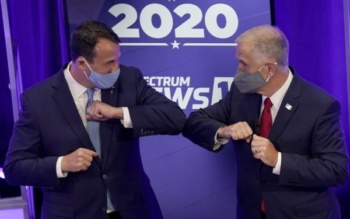
Democratic challenger Cal Cunningham (L) and Sen. Thom Tillis greet each other after a TV debate, Raleigh, North Carolina, October 1, 2020 (Gerry Broome/AP)
UPDATE, OCT. 31:
Democrats increase their chance of majority (52-48) to 78% from 77%.
State Changes
- Colorado: Hickenlooper (D) 86% chance of victory, up from 85%
- Michigan: Peters (D) 83%, up from 82%
- Arizona: Kelly (D) 81%, up from 80%
- North Carolina: Cunningham (D) 65%, up from 62%
- Georgia Special: Warnock (D) 63%, down from 64%
- Maine: Gideon (D) 60%, up from 59%
- Iowa: Greenfield (D) 55%, up from 54%
- Georgia: Perdue (D) 57%, down from 58%
- South Carolina: Graham (R) 76%, down from 77%
Latest Polls
- Georgia Special (WSB/Landmark): Warnock (D) 37%, Loeffler (R) 25%, Collins (R) 23%
- Georgia (WSB/Landmark): Ossoff (D)/Perdue (R) 47-47
- North Carolina (NBC/Marist): Cunningham (D) 53-43; (East Carolina) Cunningham 47-46
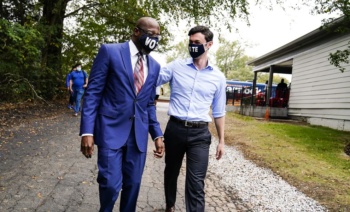

UPDATE, OCT. 30:
Democrats increase their chance of majority (52-48) to 77% from 76%.
State Changes
- Arizona: Kelly (D) 80% chance of victory, down from 81%
- North Carolina: Cunningham (D) 62%, down from 64%
- Maine: Gideon (D) 59%, down from 62%
- Iowa: Greenfield (D) 54%, down from 58%
- Georgia: Perdue (R) 58%, up from 57%
- Montana: Daines (R) 66%, up from 65%
- Kansas: Marshall (R) 76%, up from 73%
- South Carolina: Graham (R) 77%, up from 76%
Latest Polls
- Alabama (Auburn): Tuberville (R) 54-43
- North Carolina (NYT/Siena): Cunningham (D) 46-43; (UMass Lowell) Cunningham 49-45
- Iowa (Quinnipiac): Ernst (R) 48-46
- Minnesota (SurveyUSA): Smith (D) 45-42

Sen. Susan Collins (R), fighting to hold her seat in Maine, meets voters in Cornish, October 29 (Robert F. Bukaty/AP)
UPDATE, OCT. 29:
Democrats increase their chance of majority (52-48) to 76% from 74%.
State Changes
- Minnesota: Smith (D) 93% chance of victory, down from 94%
- Michigan: Peters (D) 82% chance of victory, up from 81%
- Arizona: Kelly (D) 81%, up from 78%
- North Carolina: Cunningham (D) 64%, up from 63%
- Georgia Special: Warnock (D) 64%, up from 55%
- Maine: Gideon (D) 62%, up from 61%
- Iowa: Greenfield (D) 58%, up from 57%
- Georgia: Perdue 57%, down from 68%
- Montana: Daines (R) 65%, down from 68%
- Kansas: Marshall (R) 73%, down from 75%
- South Carolina: Graham (R) 76%, down from 79%
- Alabama: Tuberville (R) 79%, down from 81%
Latest Polls
- Minnesota (SurveyUSA): Smith (D) 45-42
- Michigan (ABC/WashPost): Peters (D) 52-46; (Detroit/WDIV) Peters 48-39; (NYT/Siena) Peters 49-41; (MIRS/Mitchell) Peters 52-43
- South Carolina (East Carolina): Graham (R) 49-46
- Georgia (Monmouth): Ossoff (D) 49-47
- Georgia Special (Monmouth): Warnock (D) 41%, Loeffler (R) 22%, Collins (R) 19%
- Arizona (Reuters/Ipsos): Kelly (D) 51-44
- Iowa (WHO): Greenfield (D) 51-45

Sen. David Perdue and Democratic challenger Jon Ossoff debate in Georgia Senate campaign
UPDATE, OCT. 28:
Democrats remain at 74% chance of majority (51-49 or 52-48)
State Changes
- Minnesota: Smith (D) 94% chance of victory, up from 92%
- Michigan: Peters (D) 81% chance of victory, up from 80%
- Arizona: Kelly (D) 78%, down from 78%
- North Carolina: Cunningham (D) 63%, down from 64%
- Maine: Gideon (D) 61%, down from 63%
- Georgia: Perdue (R) 68%, down from 69%
UPDATE, OCT. 27:
Democrats 74% chance of majority (51-49 or 52-48)
State Changes
- Arizona: Kelly (D) 79% chance of victory, up from 78%
- Maine: Gideon (D) 63%, up from 62%
- Iowa: Greenfield (D) 57%, up from 56%
- Georgia Special: Warnock (D) 55%, up from 53%
- Georgia: Perdue (R) 69%, down from 70%
- South Carolina: Graham (R) 79%, up from 77%
- Alabama: Tuberville (R) 81%, up from 79%
ORIGINAL ENTRY: The 2020 US elections are not just about Joe Biden or Donald Trump in the White House. They are also about control of the Senate and thus Congress.
The Republicans have a 53-47 majority in the upper chamber. While the Democrats gained 41 seats in the 2018 mid-term elections for a working majority in the House, the GOP kept the Senate because of a favorable electoral map — the large majority of vulnerable seats were held by Democrats.
This year the starting position is far different. In the 13 key races, there are 10 Republican incumbents and only three Democrats, so the GOP has far more to lose including its Senate control.
Summary: Democrats On Course for Narrow Majority
Of the 100 Senate seats, 35 are being contested this year.
To take charge, Democrats need a net gain of four seats. They need only three if Joe Biden wins the Presidency, since Vice President Kamala Harris would be the deciding vote in any 50-50 tie.
In the 13 key races with Republican incumbents, five Democrats have leads, one of them — John Hickenlooper of Colorado — by a near-decisive margin.
In the three races with Democratic incumbents, Republicans lead in only one.
So if this holds on November 3, Democrats will gain a 51-49 majority. And they may get a bonus seat: their candidate Raphael Warnock has taken a surprise, narrow lead in a Georgia all-party primary with the runoff election on January 5.
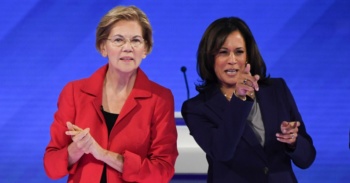
Democratic Senators Elizabeth Warren (L) and Kamala Harris, Houston, Texas, September 12, 2019 (Win McNamee/Getty)
The 10 Races with Republican Incumbents
In order from largest Democratic lead to largest Republican lead:
Colorado: John Hickenlooper (D) v. Cory Gardner (R)
Hickenlooper 84% Chance of Victory
Hickenlooper, a well-regarded Governor from 2011 to 2019, entered the contest as favorite for many analysts. He has been further bolstered by the general unpopularity of Donald Trump in the Centennial State.
Gardner, a first-term Senator, has criticized Trump on occasions, including over Trump’s support of white supremacist rallies and his trade wars. But he has still voted with the Administration 89% of the time, and hC was vital in announcing support for the rushed confirmation of Supreme Court nominee Amy Coney Barrett.
Poll Average: Hickenlooper up 8.5%

John Hickenlooper at a rally in the parking lot of a restaurant in Fort Collins, Colorado, October 13, 2020 (Lucy Morantz/The Collegian)
Arizona: Mark Kelly (D) v. Martha McSally (R)
Kelly 78% Chance of Victory
Arizona did not have a Democratic senator between 1995 and 2019, but as with the Presidential race, it is moving from a “Red” to a “Purple” state with a changing pattern of population in age, rural-suburban-urban distribution, and ethnicity. In the 2018 mid-terms Democrat Kyrsten Sinema upset Republican Martha McSally to replace the GOP’s Jeff Flake.
McSally was then appointed to fill the seat of the late Sen. John McCain. She now faces former astronaut Mark Kelly, the husband of Gabrielle Giffords, a popular US Representative from 2007 to 2012 who resigned after she was shot during an attempted assassination.
Kelly has maintained a steady advantage through the autumn of between 6% and 11% in polling, with the exception of one Republican-leaning poll and one less-regarded survey.
Poll Average: Kelly up 5.6%

Mark Kelly and Gabrielle Giffords
North Carolina: Cal Cunningham (D) v. Thom Tillis (R)
Cunningham 64% Chance of Victory
Tillis is another 1st-term senator challenging by changing demographics and diehard support of Donald Trump.
Tillis initially opposed Donald Trump’s national emergency declaration for his Wall with Mexico, but capitulated to party pressure. He has proposed a path to citizenship for some Dreamer immigrants threatened by deportation by Trump, but he has repeatedly voted to repeal ObamaCare and was a climate change denier before accepting that it might be occurring.
Cunningham is a lawyer, retired military officer, and State Representative who ran in primaries for the US Senate in 2010. He has maintained a lead of 1% to 6% in polling despite a sexting scandal this month.
Poll Average: Cunningham up 1.7%

Donald Trump looks on as Thom Tillis speaks, Charlotte, North Carolina, March 2, 2020
Maine: Sara Gideon (D) v. Susan Collins (R)
Gideon 62% Chance of Victory
Collins has been in the Senate since 1997, but she has suffered from her attempt to straddle her more moderate Republican positions and her ultimate, vital defenses of Trump.
She opposed Trump’s Muslim Ban in 2017 and has objected to his national emergency declaration for the Wall with Mexico. She voted against the repeal of ObamaCare in 2017, but later supported the removal of the individual mandate.
However, she has drawn most attention for her wavering on both the Supreme Court confirmation of Brett Kavanaugh and the impeachment conviction of Trump for abuse of power. In both cases, she swung behind Trump after pressure from Republican Majority Leader Mitch McConnell.
Gideon, the Speaker of the Maine House, has overseen passage of climate change bills and legislation to expand abortion access. She trailed Collins through the summer, but took a lead in mid-September and has expanded it in latest polling.
Poll Average: Gideon up 4.2%
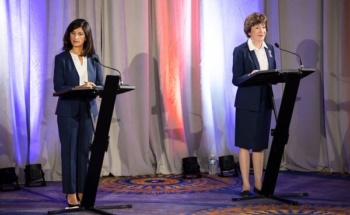
Sara Gideon and Susan Collins debate in Portland, Maine, September 11, 2020 (Brianna Soukup/AP)
Iowa: Theresa Greenfield (D) v. Jodi Ernst (R)
Greenfield 56% Chance of Victory
Along with Maine, Iowa is the surprise shift which has given Democrats hope of a majority.
Ernst is a rising star in the GOP, as vice chair of the Republican Senate Conference and a close ally of Majority Leader Mitch McConnell. Despite being a first-term Senator, she was initially expected to win re-election easily, in a state which Donald Trump won by 9% in 2016.
But just as Trump is now in a 50-50 race with Joe Biden, Ernst has sagged through the summer, possibly because she is so close to McConnell and defense of Trump’s positions.
So Democrats have put money behind Greenfield, a businesswoman who has never held elected office and had to abruptly halt her run for a US House seat in 2018 because of a campaign error with signatures.
Greenfield has gained backing for her support of ObamaCare, expansion of Medicaid, and a Coronavirus stimulus package in a state hit hard by Trump’s trade wars. She overtook Ernst in polling this month in the second-most expensive Senate campaign in US history.
Poll Average: Greenfield up 1.8%

Donald Trump and Joni Ernst
Georgia: Raphael Warnock (D) v. Kelly Loeffler (R) v. Doug Collins (R)
Warnock 53% Chance of Victory
This is the most distinctive — and thus difficult to explain and predict — Senate race.
Georgia has an all-party primary on November 3 for the seat held by Loeffler, appointed in January 2020 to replace Sen. Johnny Isakson who resigned for health reasons. The top two candidates, irrespective of party, advance to the January 5 runoff.
Loeffler was favored to hold her seat, but has been weakened by an intra-party brawl with Collins, a US Representative since 2013. Each has tried to “out-Trump” the other to win over GOP voters, but the ardent support — seen in Collins’ loud, lengthy assault on Democrats during impeachment hearings — is in a Red state where Democrats are gaining support in cities and suburban areas.
Warnock is the senior pastor of the iconic Ebenezer Baptist Church, where Martin Luther King Jr. and his father were among his predecessors, in Atlanta. Having been involved in issues from climate change to healthcare and launched campaigns for voter registration, he decided in January to run for Loeffler’s seat.
All other Democrats in the primary are far behind Warnock, giving him the possible advantage of a unified party going into the runoff.
Polling Average: Warnock 33%, Loeffler 23%, Collins 23%
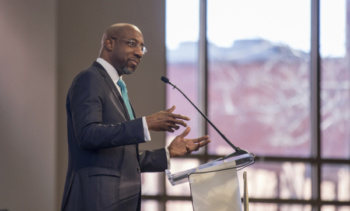
Montana: Steve Bullock (D) v. Steve Daines (R)
Daines 68% Chance of Victory
Democrats hoped to flip the seat in Red state Montana through Bullock, Governor since 2013. He has been one of the most popular state leaders in the US, and his exposure was raised by a brief Presidential run in 2019. But the task is difficult in a state where Donald Trump has a lead over Joe Biden of 6% to 8%.
Daines, a businessman and first-term senator and a fervent Trump supporter, has introduced bills to fund the Wall with Mexico and praised Trump’s handling of the Coronavirus pandemic. He has maintained his poll lead through the summer and extended it in the past month.
Polling Average: Daines up 3.3%

Steve Bullock and Steve Daines in their virtual debate, September 28, 2020
Georgia: Jon Ossoff (D) v. David Perdue (R)
Perdue 70% Chance of Victory
Georgia’s bellwether status in this year’s election, as a shifting Republican state, is reinforced by a second Senate contest.
This one is for the seat of the GOP’s David Perdue, a first-term senator and cousing of Agriculture Secretary Sonny Perdue.
A longtime CEO in the clothing and retail sector, Perdue is a close ally of Trump and a vocal defender of Trump’s Coronavirus approach. That may not have resonated well in a state which was a leader in the virus’s summer surge, thanks to Gov. Brian Kemp carrying out Trump’s demand for “reopening”, and is now 5th-highest in the US in cases.
Democrat Ossoff, a media executive and Congressional staffer, rose to national prominence in 2018 when he narrowly failed to upset Rep. Karen Handel, another Trump favorite. He has risen with his positions on women’s rights, healthcare, and immigration reform.
Perdue is still favorite, but his summer advantage has eroded and latest polls are neck-and-neck.
Polling Average: Perdue up 0.7%

Kansas: Barbara Bollier (D) v. Roger Marshall (R)
Marshall 75% Chance of Victory
Technically, this is an open seat with the GOP’s Pat Roberts retiring. It should have been an easy Republican hold in a state which has not elected a Democratic senator since 1933.
But the party’s grip was weakened in a primary where former Trump favorite and governor Kris Kobach, known for his bungled attempt to back up Trump’s claims of election fraud, faced two-term US Representative Marshall. The Republican establishment breathed a sign of relief when Marshall, seen as a more reliable and electable conservative, prevailed; however, the exposure opened the door for the challenge of Bollier, a physician and State senator.
A former Republican, Bollier has campaigned strongly and won endorsements from former high-ranking politicians of both parties, including long-time GOP Sen. Nancy Kassebaum.
Polling has been sparse but shows Marshall with a lead, but not an unassailable one.
Latest Poll: Marshall ahead 46%-42%

Attendees at a rally for Roger Marshall and other Republican candidates, El Dorado, Kansas, October 3, 2020 (Jim McLean/Kansas News Service)
South Carolina: Jamie Harrison (D) v. Lindsey Graham (R)
Graham 77% Chance of Victory
Perhaps the most surprising and high profile of this year’s contest, with Graham — close friend and defender of Donald Trump and member of Congress since 1995 — unexpectedly fighting for his political future.
Until the summer, the political wisdom was that Graham’s conversion to embrace Trump (in December 2015, he called Trump a “race-baiting, xenophobic religious bigot”) would easily bring re-election with its appeal to a conservative base.
But the campaign of Harrison, former chair of the South Carolina Democratic Party, galvanized new voters across the state’s diverse racial spectrum and was further boosted by the social issues raised around Black Lives Matter marches. A grassroots fundraising effort has now been complemented by funds from the national party, making Harrison the first candidate to raise more than $100 million in a Senate campaign.
Graham’s large lead evaporated by September. Some recent polls have shown a narrow Harrison lead, but the most detailed from Siena and the New York Times gave Graham a 6% edge as of October 14.
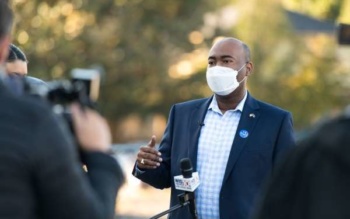
Jamie Harrison
The 3 Races with Democratic Incumbents
In order from largest Democratic lead to largest Republican lead:
Minnesota: Tina Smith (D) v. Jason Lewis (R)
Smith 92% Chance of Victory
Smith, a businesswoman who was Minnesota’s Lieutenant Governor, won a special election to replace Sen. Al Franken in January 2018. She has had a healthy poll lead over Jason Lewis, who was a US Representative from 2017 to 2019 but lost in the November 2018 mid-terms.
However, a Survey USA lead covering Oct. 16-20 showed Smith with only a 43-42. Is the poll an outlier? Republicans are gambling it is not and pouring money into Lewis’s campaign for the run-up to November 3.
Poll Average: Smith up 5.8%

Former Rep. Jason Lewis at a campaign rally (Stephen Maturen/Getty)
Michigan: Gary Peters (D) v. John James (R)
Peters 80% Chance of Victory
Michigan’s vital role in the Presidential election is replicated in the battle for Senate control, with the Republicans targeting Peters, a US Representative and then Senator since 2009.
Peters is a centrist Democrat who is considered one of the most bipartisan members of Congress. He has backed abortion rights, supported a firm line with China over technology and investment, and backed background checks for gun owners.
Businessman and veteran James has been promoted by the Republicans as one of its few high-profile Black American candidates, with Donald Trump providing vocal support on Twitter.
James lost the 2018 Senate race to Debbie Stabenow. He was considered by the Trump Administration as Ambassador to the UN before he was recruited to challenge Peters this year.
The candidate is well-regarded but has to overcome Trump’s sliding popularity in the state as well as Trump’s attempt to whip up right-wing protests, including by armed factions, against Gov. Gretchen Whitmer’s Coronavirus measures.
There was a blip for the Democrats with an October 11 Siena/New York Times poll showing Peters with only a 1% edge, but almost all other surveys have the Democrat with a 6% to 11% margin.
Polling Average: Peters up 5.4%

Gary Peters speaks an event with Joe Biden, Southfield, Michigan, October 16, 2020 (Carolyn Kaster/AP)
Alabama: Doug Jones (D) v. Tommy Tuberville (R)
Tuberville 79% Chance of Victory
With Alabama still among the deepest Red of Red states, this was always the best hope for the GOP to reclaim a seat from Democrats.
Attorney Jones won the seat in a 2018 special election versus the GOP’s Judge Roy Moore, who was embroiled in revelations of his “dating” of teenagers when he was a District Attorney.
Jones has maintained a solid, centrist profile in the Senate, but he is the only statewide elected Democrat in Alabama since 2008.
Tuberville was head coach of the Auburn University football team. In a state where football coaches can become icons, that and his allegiance to Trump were enough to propel a Senate candidacy. His most notable statement has been to join Trump’s verbal assault on Jeff Sessions, the Alabama Senator who became Trump’s Attorney General: ” [He] wasn’t man enough to stand with President Trump when things got tough.”
Polling has been limited. Tuberville has held leads of 12% to 15% except for one mid-October survey that gave Jones a 1% edge.

Tommy Tuberville as head coach fo the University of Cincinnati Bearcats, November 18, 2016 Cincinnati, Ohio (Ian Johnson/Icon Sportswire/Getty)

